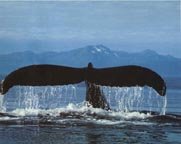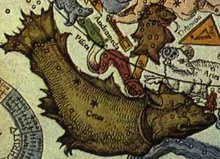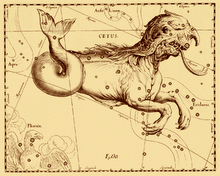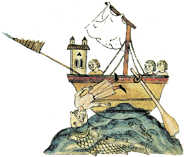Grifs (Me)
The job search is continuing. Yesterday I had an interview, which puts me in this pattern of meeting and talking to people at the beginning of the month, with my job search and resources waning by the end of the month. The past two weeks have been no exception due to my visit to the doctor for my diabetes and getting over my inflamed tonsils and stomach flu.
Yesterday before my interview at a marketing company -- where everyone seems to be 24-years-old and first generation American -- I kind of knew that I was going to get the gig. The interviewer was from Hungary and we spoke a little German. I told him that I want Portuguese and French to be next on the list and was very much interested in the traveling and international aspects of the job. I applied for the 10 month manager training program and was called into the office for the second interview on tomorrow. I am not so sure about the legitimacy of this "online" marketing team, there is much I need to research concerning their background and if they are registered with any nationally accredited association of marketers . . . and such and such. But screw it, I will check it out tomorrow, the job market has changed rapidly, so traditional avenues in business may or may not work out in every situation. Plus if this second day is too Cousin Vinnie-esque then I am out of there a pinch the wiser.
Refugees of the Union Army (My Mother)
The other thing that happened was a leap in my genealogical research. I have been doing this for a couple of years, but it has again been put on hold due to money, health and family issues. I have been concentrating on my mother's side of the family for years now. From what I can tell, my ancestors were enslaved outside of Atalanta, just south of the city, in Forsythe County. Then, sometime during or after the Civil War, my ancestors moved from that area and settled in Clay County Alabama, which was cut out of a portion of Talladega and Randolph counties by the Union Army during Reconstruction. This had to have happened sometime before 1870. Interestingly enough, my ancestors seemed to be living on different plantations in Georgia but kept in contact enough to put the family back together after emancipation (just a hunch). In fact, we stayed together as family unit in Clay County Alabama until 1923 when Clay County’s economy started to decline rapidly due to the lull in demand for graphite after World War I, its. Then the family moved to Anniston, Alabama.
I have a clear view of what happened to my mother's family's world after the Civil War, but very little concerning the time before. My oldest known maternal descendant is Neal Willoughby. He is my great-great-great-great-great-grandfather. He was born in 1807 in the state of Georgia, just before Alabama became a state in the union. According to the census taker in 1880, Neal did not know the origins of his parents.
There are a lot of interesting possibilities concerning Neal's household and the people who lived in it. He lived with his daughter Clarry Mann, and his two granddaughters Adeline and Ollie. Both are listed as mulatto, a distinction that will be erased from the American census by 1890. Adeline is 11 and her younger sister is 9 their younger brother Bait is not mentioned. They live next door to a woman named Harriet Jenkins, who by some sources is related to us (an older sibling possibly of Adline and Ollie), and by others not. Of course these sources are oral. And when I drove to the area where they settled after leaving Georgia, the cotton fields were shockingly dry and delicate, like puffed icicles on sticks. The sky was gray and the mountains looked uninhabitable. It was both beautiful and demanding.
I am going to ask my cousin Stan if he wants to drive there one day when I go visit him in Atlanta. I know that their graves have no stones anymore, and I want to see the church where they were members. I hope it is still there. According to a first hand account of life in Clay County, the black church was where the first generation of free children went to learn to read, and there was also only one recorded lynching in that small area in 1888. Even today there is no railroad pass that goes through that section of Alabama, and you can't take the main interstate to get to the county set of Lineville. It is also a dry county, so you can't drink when you get there. The library where I picked up the first person narrative is a white one room house. The stone courthouse where I picked up the marriage certificates still feels like a place where you make arrangements to relinquish livestock to the bank. Funny, I don't know why I miss it.
Abandoned on Dauphin Island (My Father)
So, my father's family is a far greater mystery to me, I know few of family members and even fewer family stories. My mother's family is a progression of family names, that included ministers and wayward black sheep that would go on to put their oratory skills towards secular educations; and, soothsaying women that could crunch great amounts of numbers and forms in their heads (on a spring day in 1908 my great-grandmother Ola received a dress for her 12th birthday that she didn't like, she took it apart overnight and resewed it into a new dress by the next morning).
My father's family is born with a great one sentence fable: "Our family starts with a mother and daughter named Mariah and Mirandi coming off a slave ship." Springing from this utterance are other chance sentences. Like, while driving on summer afternoon, when I was probably around college age, I asked my father of our origins. Without batting an eyelash he said: "You see, back in the 1830's they decided that blacks had souls. So we took our last name from the Quaker missionaries that baptized us." And most recently my grandmother told me at her birthday party very proudly, "My grandmother was one hundred percent pure African, she had no white in her." I have been reading and searching through all those that have my last name for pieces to the large puzzle. Our migrations between Florida, Alabama, Mississippi and Louisiana. Our acquisition of a great track of land in 1950. Our farms. Our scandals. Our tempers. Our bluesy accusatory creed: "You want other people to do for you, but you ain't willing to do anything for anyone else." And the question is still out. Are we a splintered branch of a larger Creole past, pure Africans, part Creek Indian, saved or conjurers? I am pretty sure about which traits I inherited.
Cadenza
My parents drive me crazy and over the past 2 years I have had to find things that help us communicate in a more loving and nurturing manner. It is not that we hate one another; it is because all of the rites of passage that come with marriage and parenthood are missing from my life; therefore, all things in my life are questioned. Personal progression does not register with my parents. Education is vocation. Relationships are to be affixed to the greater family unit. Personal experience (i.e. the search for some hot fucking) does not trump familial bonds and obligations (but it never has). The reason is that they were busy pushing further into America and assimilating to the mainstream world, while sexual exploration and the modification of gender specific roles transformed the rest of their generation (is this not the epoch of our parents' civil rights generation). Now, my mother is learning how to operate a computer as a 20-year divorcee, unaware of how life could have been happier if she had not taken so many things in the manner of a failed Ozzie and Harriet. She didn't look up to see that the social marker of divorce was melting away. My father is working in a cyber-world where all ideas of honor and decency no longer follow his John Wayne colorized world. He is raising a child and living his life as if he was 20 years younger, but every day he has to adjust to all the new stimuli that is pumped out of our media world. He is far from dazed and confused; he just etches out a world that is smaller -- working on the American Dream, which for baby boomers now means a world or perpetual unrest. As for me, I have come home refusing to drink domestic beer and watching soccer on the Fox soccer channel. I block out stimuli too. I am married to the road probably more than they would wish, but this is what I have always known. Custody meant time with my mother, grandmother and father. All were in three different places. School was always in one place, but life for me has always signified elsewhere. I had no family in Nashville; bonds of family have always been distant and transfered through second hand accounts about the past, like a hand-me-down that has surprisingly come back into fashion.
To get through the numerous impasses that my disease, lifestyle and career choices have made between my parents and I, a couple of exercises naturally create a truce. My mother and I both love gardening and the sense of pride it brings to a home. For my mother it brings back memories of my great-grandmother, Ola the seamstress, and her beautiful azaleas, or my great uncle's roses and miniature citrus garden. For me it is the physical labor, which I crave. Teaching and researching dulls a part of me that longs just to move my body and literally see the fruit of ones labor. To labor and simply be finished with it, instead of agonizing over a project for weeks, is how I prefer to work. Gardening means maintaining your rewards by spraying after a rain to keep the fungus away, constantly planning what to do with the landscape, kneeling, alternating the menu for your roses with rock salt one week and bone meal on another, etc . . .
For my father I just discovered a way to displace our body armor and blunted weapons, which may be aimed at one another, but with an unintentional maliciousness. We are simply bumping through our respective years in a dark cave, grieving over false promises, trying to remember which path we took before the light a the end of the cave gave out. Yesterday I was reviewing the Afro Louisiana History and Genealogy website, when my father walked in and saw the result of my search. The website is the brainchild of Gwendolyn Midlo Hall, who for me is the most amazing academic in the game.
"Wow that is amazing. Those are all slaves?" He said, standing over me with another of his company's many administrative assignments for me to complete before his meeting and my interview in midtown.
"Yes."
My father stared. He wanted to stop and continue the conversation, but he clearly had something else on his mind. It felt vaguely like my childhood -- I would be busy doing a painting or cooking and he wanted to stop and engage me more, but he had to catch a flight.
He continued. "Where is that document located?"
"Louisiana, Dad. The Catholic colonies were far more meticulous in keeping records of conversions, deaths, births and marriages between slaves . . ."
He interrupted, "How much would someone pay you for that information?"
Nothing I thought to myself. That is my problem.
"Don't know?" I replied.
"Ten thousand?" he speculated.
I thought to myself again, "This is my problem the expectations from society that somehow my degree and skill set rewards me the same way it does his". But maybe I am just being too cynical. My paternal great-grandfather Willy Mills was a cynic. He was part Creek Indian and part black and shot at anything that came down his driveway. An aunt said that he spoke a language to himself that no one really understood.
Awkward silence followed a feeling that my father was generally interested. And I did not feel like raising my voice. Maybe the ancestors are getting us over this hill.
"Do you know where St. Landry is? That is where I found this document." I asked.
My father giggled and heaved a bit of air out of his closed mouth at the same time.
That meant no.
Coda
I saw my own name in the entry of slaves. I was overwhelmed with a sense of displacement -- it was a melancholy and flightiness that was not induced by ideas of pain and suffering, but by how easy slavery was in its actual facility and practice. At one point slavery was just that normal and common place bondage actually effaced itself. There was this great sense of mobility about that other William Mills, who was 25-years-old in 1806. This William Mills was sold by a John Foley to Alexander Mills sometime in August of that year in Orleans parish. Did he stay long enough to become an ancestor or did he float on? I wonder if he actually became me, the man I am today, taking on a wife or shepherding someone else's child. He probably did not see emancipation, that was 60 years away, but he would have seen a quadroon ball, the advance of the Americans, maybe Andrew Jackson himself.
The problem I have with this documentation and so many others is that it does not have any thing listed under the subheading 'Personality'. Maybe the note takers would only mention the bad. But there is something so crazy about all these transactions. Men and women are shuffled and with no fixed identity. You can just slip them in and out of towns, names, clothes, jobs, relationships, languages and other people's willed inheritances with little knowledge of who they are. Documentation for that moment is just a fixed point; William Mills could have just as well turned into a butterfly by the fall of 1806 and flew back to Africa against the Harmattan.
There are 49 Mills slaves in Dr. Hall's archive. There are no Mariah's or Mirandi's among the Mills transactions. There are a couple of grifs. Many 'pure' Africans. I can't tell who was Christian and who was not. For whom is conversion necessary? Probably for me, who needs to be converted from 'the road' in order to establish a élan in executing out my plans; and definitely for the true solitary Mills ancestor who I envision as a boy -- a Black/Indian mixed lot -- a maroon, outside of New Orleans, forced into a new life in the aftermath of the Seminole Indian wars. I get the feeling he had to become a Christian due to circumstances he could not understand or comprehend, binding his own Afro-Indigenous American liturgy to his inner thigh with a piece of leather binding and a little red gris-gris. What an ingenious invention.
Tuesday, April 03, 2007
Subscribe to:
Post Comments (Atom)







10 comments:
Tres interessant, and yes, Midlo Hall is the one to read! St. Landry Parish? It is more or less in Acadiana, up the bayou, but I guess you know that. There's Carl Brasseaux' book too,
http://www.amazon.com/Creoles-Color-Bayou-Country-Brasseaux/dp/0878059490 , don't know if it will help in a specific way, but it is interesting.
Thanks for the heads up. I picked up Midlo Hall's history of NOLA from my stack of books. I do want to read it again after stumbling on this website. When I read it ten years ago, I had trouble . . . but I was a lit guy then.
I will be sure to check out Brasseaux's book. Now I am reading ON THE ROAD. I have been so embarassed about not reading it . . . but since I have gotten back to NYC, some writers are now speaking to me in a way they could not have before.
Ah! . . . Life and books.
I haven't read ON THE ROAD either, and I need to. This Ann Waldman in whose poetry I got interested a couple of weeks ago in Minnesota, works at the "Jack Kerouac School of Disembodied Poetics" ... !!!
That sounds hot. I will have to check it out. I can tell you from the first couple of chapters that I have read, that Kerouac was searching for an "Americaness" that seemed very logical and ordinary to his inner being.
There is something to be said about that drive for Americaness in the practice of literature. Some things have become clearer to me concerning American culture by reading it.
OK, I'll make a point of it!!
Meanwhile, you know my youngest brother now lives up by you and he is a Louisiana Creole genealogy hound. You should MySpace him or something:
http://www.myspace.com/christophe80
Thanks. Mad cool. I got some issues with my French and knowledge of Lousiana, and it good to talk to someone with the same interest.
My myspace page is unbeachedwhale.blogspot.com
Sorry.
myspace.com/unbeachedwhale
OK so I e-mailed him. He lives in 2 cities really so might take a few days to get on line ... :-)
Fascinating post, as always...!
Thanks Prof. Z.
Thanks J. I appreciate your comments and notes on my entries as always.
Post a Comment